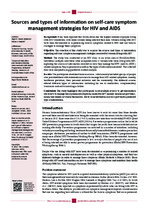Sources and types of information on self-care symptom management strategies for HIV and AIDS
Abstract
Human Immunodeficiency Virus (HIV) has been known to exist for more than three decades now and there are still new infections being documented, with the recent statistics showing that, in the year 2012, there were about 2.3 (1.9–2.7) million new infections worldwide(UNAIDS [Joint United Nations Programme on HIV/AIDS] 2013:4). Prevention programmes such as the LoveLife HIV prevention programme in South Africa that targets the youth have been established and are running effectively. Prevention programmes are involved in a number of initiatives, including voluntary counselling and testing, treatment for sexually transmitted diseases, condom promotion campaigns, abstinence, prevention of mother-to-child transmission (PMTCT) programmes and
many more (Global HIV Prevention Working Group 2004:1). It has been documented, however, that the coverage of prevention programmes is low, as only a fraction of people who are at risk of being infected are able to access proven programmes for prevention (Global HIV Prevention Working Group 2004:1). People who are living with HIV have been documented as experiencing a number of related symptoms, such as anxiety and depression as well as other physical symptoms, and they use different strategies in order to manage these symptoms (Marie Modeste & Majeke 2010). Those living with HIV need information on how to manage these symptoms and maintain their health (O’Grady 2008:261; Tsai, Hsiung & Holzemer 2002:301).

